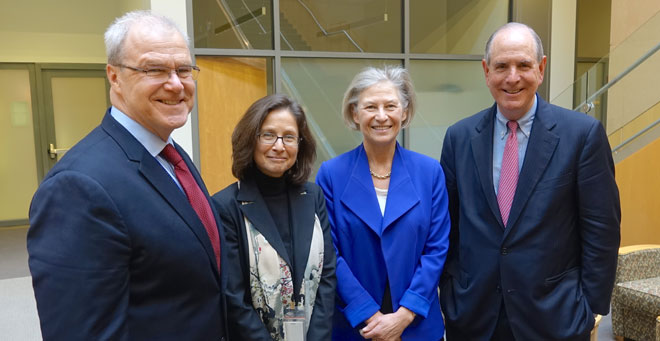 |
|
|
Mass. Secretary of Elder Affairs Alice Bonner, PhD, (second from left) with (from left) Terence R. Flotte, MD; Michele P. Pugnaire, MD; and Michael F. Collins, MD. |
UMass Medical School is working with Massachusetts Secretary of Elder Affairs Alice Bonner, PhD, to help improve elder services and health care in the commonwealth.
“Connecting health systems with community-based care is one of our agency’s primary goals,” said Dr. Bonner. “There are many opportunities to connect around medical and nursing student education, and work with residents and attending physicians, nurse practitioners and other health care professionals in order to prioritize areas of collaboration around care of older adults in the commonwealth.”
A member of the UMMS Graduate School of Nursing class of 2008, Bonner was appointed elder affairs secretary in 2015. She previously directed the nursing home division for the federal Centers for Medicare & Medicaid Services, and directed the Massachusetts Bureau of Health Care Safety and Quality, which oversees nursing homes.
“With Baby Boomers now the rising generation of adults over the age of 65, resources need to be expanded and we need to prepare to meet the demand,” said Michele Pugnaire, MD, senior associate dean for educational affairs and professor of family medicine & community health, one of several education leaders from the School of Medicine and Graduate School of Nursing who met with Bonner at UMMS on Feb. 16. “As the state’s only public medical school, we have demonstrated a readiness, capacity and synergy in the alignment of our educational mission with the greater good of the commonwealth.”
UMMS brings a strong foundation in interdisciplinary geriatric education to the table. Last year the Meyers Primary Care Institute, led by Jerry Gurwitz, MD, the Dr. John Meyers Professor of Primary Care Medicine, professor of medicine, chief of the Division of Geriatric Medicine and executive director of the Meyers Primary Care Institute, celebrated 20 years of improving population health through innovative research and educational initiatives. With its special focus on the care of older adults, the Meyers Institute is already involved in fall prevention efforts with the Massachusetts Department of Public Health.
In 2009, UMMS received a four-year, $2 million grant from the Donald W. Reynolds Foundation for integrated geriatrics education. Under the direction of Sarah McGee, MD, clinical associate professor of medicine and clinical chief of the Division of Geriatric Medicine, grant initiatives fostering the creation, refinement and integration of geriatric education initiatives at UMMS have provided a lasting legacy for the education of health care professionals across the UMMS system and beyond, and placed geriatrics at the forefront of interprofessional education at UMMS.
Priorities for the Office of Elder Affairs include reducing elder drug misuse, falls prevention and avoiding elder neglect.
Notably, UMass Medical School’s highly touted response to the opioid crisis, which features clinical training and prescription monitoring in cooperation with the Massachusetts Department of Public Health, may serve as a model for similar collaborations with Elder Affairs. “I’m pleased that we could talk about some of the work in Worcester County around the opioid crisis, the educational programs that you have conducted with prescribers and the potential to address opioid use and misuse among older adults as a next step in this initiative,” said Bonner.
“We have a proven track record around the opioid crisis of being able to respond robustly to meet educational needs,” said Dr. Pugnaire. “The next phase is developing a more detailed plan with Elder Affairs.”
Also meeting with Bonner were Chancellor Michael F. Collins; Terence R. Flotte, the Celia and Isaac Haidak Professor of Medical Education, executive deputy chancellor, provost and dean of the School of Medicine; Joan Vitello, PhD, dean of the Graduate School of Nursing; James Leary, JD, vice chancellor for community and government relations; and Barbara Weinstein, MBA, senior director of the Center for the Advancement of Primary Care, a joint venture of UMMS and UMass Memorial Health Care.
Pugnaire and Dr. Vitello are engaged in further discussions with Bonner to select one or two specific pilot initiatives that will capitalize on the medical school’s rich resources in geriatric health training and care.
Related stories on UMassMedNow:
UMMS geriatrics researcher Jerry Gurwitz highlights uncertainties about risks vs. benefits in elderly in JAMA Viewpoint
Meyers Primary Care Institute celebrates 20 years
AP Big Story: UMass Medical School trains students to fight opioid abuse
Meyers Primary Care Institute at UMMS part of $30 million national falls study
Jerry Gurwitz talks with Boston Globe on safe drug use for elderly patients
Dr. Bonner goes to Washington (well, Baltimore)